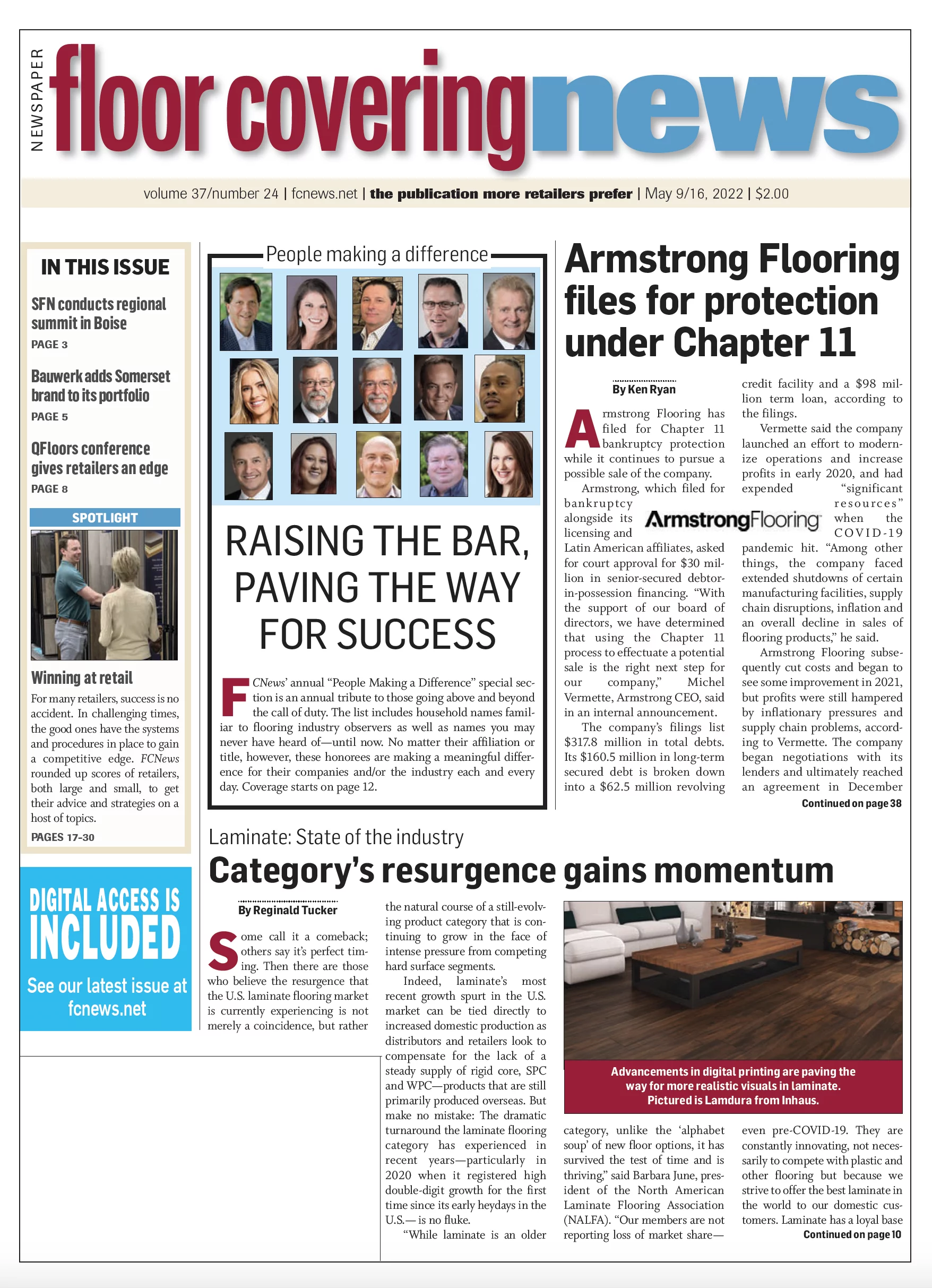 Armstrong Flooring has filed for bankruptcy. Not much of a surprise at this point, and it’s certainly not the first longstanding company to do so. What’s more, many have emerged with a better balance sheet and better positioned for the future—GM, Chrysler, Marvel, Converse, Delta and Texaco being some.
Armstrong Flooring has filed for bankruptcy. Not much of a surprise at this point, and it’s certainly not the first longstanding company to do so. What’s more, many have emerged with a better balance sheet and better positioned for the future—GM, Chrysler, Marvel, Converse, Delta and Texaco being some.
Michel Vermette, CEO, cited “supply chain challenges, the current inflationary environment and continued headwinds from the COVID-19 pandemic” as factors leading to the Chapter 11 filing. He also talked about being unable to raise prices to a requisite level to offset its escalating costs. But these challenges are the same for every manufacturer, many of which are thriving. It is my belief that Vermette landed in a difficult situation from day one, faced with righting a ship that was steered into rough waters long before he arrived on the scene. I think the bigger factors were rough seas and a captain or two that steered the ship into an iceberg.
Let’s start from the beginning. Armstrong was—and is—one of this industry’s most venerable brands. The company was known as Armstrong World Industries comprising two divisions: ceilings and flooring. When I came into this industry in 1994 its flooring sales pretty much equaled those of its three largest competitors—Congoleum, Tarkett and Mannington—combined. The products it sold were sheet vinyl, VCT and maybe a little linoleum. Distributors put their kids through college and took lavish trips because of Armstrong. There were multiple Armstrong distributors in almost every market. They were extremely loyal. They would never even consider taking on another vinyl line. It was a different time indeed.
Sometime between 1994 and 1998, Armstrong moved to single distribution. Those who made the cut became even more loyal. Many of those who didn’t make the cut went out of business. But now there were only 15 or 16 Armstrong In 1998, Armstrong purchased Triangle Pacific, the country’s largest hardwood flooring manufacturer, for around $900 million. It added about $650 million in annual sales to Armstrong’s existing $2.2 billion.
Then a funny thing happened on the way to the forum. A new category began to emerge: LVT. Some of the early players were Metroflor, EarthWerks and Karndean. Armstrong didn’t have a similar product, and Michael Raskin, then president of Metroflor, approached the Armstrong distributors about taking on the line. Many did. Then Metroflor introduced Konecto, the first floating LVT. The distributors loved the higher-margin opportunities the product provided. They focused on that. Loyalty only goes so far when the almighty dollar gets in the game. I remember former CEO Frank Ready’s famous line to distributors: “You’re either with us or against us.” Distributors told Armstrong to shut up and get them some LVT.
Over the past 20 years, LVT and all its iterations have grown at the expense of sheet vinyl and VCT. Armstrong introduced many LVT products, but they were neither special nor different. They never held the same dominant position as they did with sheet.
Then you had Shaw and Mohawk getting into the sheet vinyl game. Shaw was getting product from Tarkett and Mohawk bought IVC. The two behemoths also got into LVT in a big way. Armstrong was no longer the dominant resilient player.
As mentioned earlier, Armstrong consisted of a flooring division and a much more profitable ceilings division. In 2015, Armstrong spun off its flooring business to create two separate, publicly traded companies. Sales were about $1.25 billion in both divisions, but ceilings was the breadwinner.
More recently, former CEO, Don Meier, tried something that didn’t seem to work so well: get rid of the Armstrong sales force and leave the selling and marketing to the distributors. You know what happens when you lose control of your own destiny? When Vermette arrived at Armstrong I believe the company had one person out in the field. Maybe.
Then in 2018, Meier sold off the wood business for $100 million—the same business it had purchased 20 years earlier for $900 million. Sales had declined in that time from $650 million to $430 million.
What was left was the core vinyl business, which was probably doing around $600 million. Many observers said that volume was probably too small to remain a public company and should have been sold back then and taken private. Vision is 20/20 in retrospect.
Last year, Armstrong made the decision to go direct to key accounts, leaving the distributors to handle B and C retailers. Suffice to say, they didn’t like that so much. Some switched to Tarkett; some added Tarkett. They pretty much repeated Ready’s line, only in reverse.
On top of the challenges Vermette cited, there is one more: unions. I was recently told Armstrong has to deal with eight different unions. I don’t know if that’s true, but there are a bunch. It’s never easy dealing with unions, especially in this climate.
The bottom line is this has been a volcano waiting to erupt for some time. Here’s hoping the bankruptcy filing gives this old company a new lease on life. distributors. They were gaining leverage.

